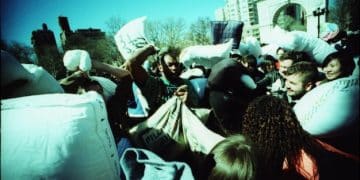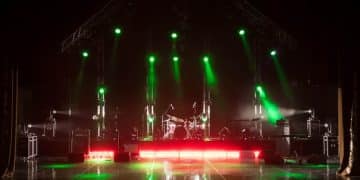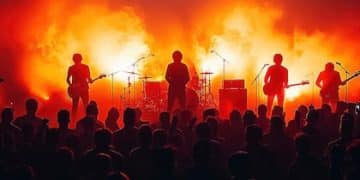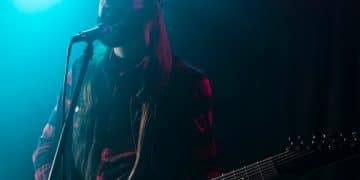Concert Aftermath: How to Recover from Headbanging and Heavy Metal
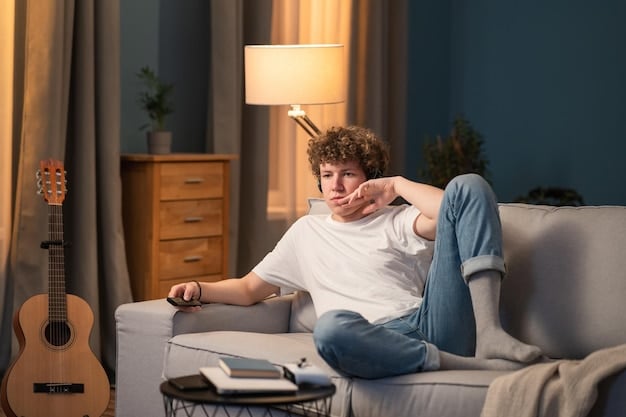
The concert aftermath, especially following a night of headbanging and heavy metal, requires strategic recovery methods, including hydration, proper nutrition, rest, and gentle stretching, to mitigate muscle soreness, dehydration, and potential hearing issues.
So, you’ve survived a night of headbanging and moshing at a heavy metal concert? The adrenaline was pumping, the music was deafeningly awesome, but now the aftermath is hitting hard. Let’s explore how to tackle the concert aftermath: recovering from a night of headbanging and heavy metal.
Understanding the Concert Aftermath
Concerts, especially those featuring high-energy genres like heavy metal, can be physically demanding. The combination of loud music, intense movement, and dehydration can lead to a range of post-concert symptoms. Understanding these potential effects is the first step in effective recovery.
The impact on your body goes beyond just feeling tired. You’re dealing with muscle fatigue, potential dehydration, and the effects of prolonged exposure to loud noise. Let’s delve into each of these aspects to better understand the recovery process.
Why Concerts Take a Toll
Concerts are a sensory overload. The loud music causes your muscles to tense up, contributing to fatigue, also all the jumping, headbanging, moshing, even just standing for extended periods can cause strain.
Common Post-Concert Symptoms
- Muscle soreness and stiffness
- Dehydration and headaches
- Tinnitus or temporary hearing loss
- Sore throat from singing or shouting
Recognizing these symptoms early can help you take proactive steps to mitigate their effects and speed up your recovery. Sometimes it’s tempting to ignore the aftereffects, but taking care of yourself is crucial.
In conclusion, understanding the physical demands of a concert is crucial for planning an effective recovery strategy. Recognizing common symptoms allows you to address them promptly and ensure a quicker return to your normal routine.
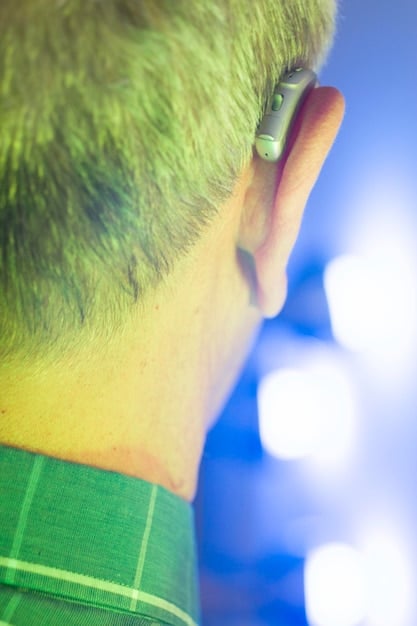
Hydration and Nutrition Strategies
Dehydration and energy depletion are common after a concert. Replenishing fluids and nutrients is essential for recovery. This involves more than just drinking water; it’s about restoring electrolytes and providing your body with the fuel it needs to repair itself.
Proper hydration and nutrition can significantly reduce the severity of post-concert symptoms like headaches and muscle cramps. Let’s explore some practical strategies to get you back on your feet.
The Importance of Electrolytes
Electrolytes, such as sodium, potassium, and magnesium, are lost through sweat and physical exertion. Replenishing these is critical for muscle function and hydration.
Foods to Eat After a Concert
- Bananas for potassium
- Sports drinks for electrolytes
- Lean protein for muscle repair
- Complex carbohydrates for sustained energy
Timing is also important. Try to consume a balanced meal within a couple of hours after the concert to kick-start the recovery process. Avoid processed foods and sugary drinks, as these can exacerbate dehydration and inflammation.
By focusing on hydration and nutrient-rich foods, you can effectively combat the physical strain of a concert and accelerate your recovery. Remember, giving your body what it needs is as important as the rest itself.
Rest and Relaxation Techniques
Rest is paramount for recovery. Your body needs time to repair muscle tissue and restore energy levels. However, simply lying in bed might not be enough. Incorporating relaxation techniques can enhance the restorative process.
Quality sleep and relaxation practices can significantly reduce muscle soreness and mental fatigue. Let’s explore some effective methods to help you unwind and recover fully.
Creating a Relaxing Environment
Make your bedroom a haven for rest. Dim the lights, lower the temperature, and eliminate any distractions. Consider using blackout curtains or a white noise machine.
Effective Relaxation Techniques
- Gentle stretching to ease muscle tension
- Deep breathing exercises to calm the nervous system
- Meditation or mindfulness to reduce stress
Avoid screens before bed, as the blue light can interfere with sleep. Instead, try reading a book or listening to calming music. Prioritizing rest and relaxation sets the stage for a quicker and more complete recovery.
In summary, rest and relaxation are not passive activities but active strategies for recovery. Creating a soothing environment and incorporating relaxation techniques can profoundly impact your well-being after a demanding concert.

Managing Muscle Soreness
Muscle soreness is a common complaint after a vigorous concert. Active recovery methods, such as gentle stretching and light exercise, can help alleviate discomfort and promote faster healing.
These techniques work by increasing blood flow to the affected muscles, reducing inflammation, and improving flexibility. Let’s explore some practical approaches to managing muscle soreness effectively.
The Benefits of Gentle Stretching
Stretching helps to lengthen muscles, improve range of motion, and reduce stiffness. Focus on major muscle groups, such as the neck, shoulders, back, and legs.
Active Recovery Exercises
- Light walking to increase blood flow
- Foam rolling to release muscle knots
- Swimming to reduce joint stress
Avoid high-impact activities that could further strain your muscles. The goal is to gently encourage recovery, not to push your body to its limits. Consistency is key, so make these practices a regular part of your post-concert routine.
Overall, managing muscle soreness requires a combination of gentle stretching and active recovery exercises. By promoting blood flow and reducing inflammation, these techniques can help you recover more quickly and comfortably.
Protecting Your Hearing
Exposure to loud music at concerts can lead to temporary or even permanent hearing damage. Protecting your ears is crucial for long-term hearing health. Prevention is always better than cure, so taking proactive steps is essential.
Using earplugs and limiting exposure time are two effective strategies for minimizing the risk of hearing loss. Let’s delve into these methods more thoroughly.
The Importance of Earplugs
Earplugs significantly reduce the intensity of sound reaching your ears. Opt for high-fidelity earplugs that attenuate sound evenly without muffling the music.
Strategies for Limiting Exposure
- Take breaks in quieter areas
- Avoid standing directly in front of speakers
- Limit the duration of your concert attendance
If you experience tinnitus (ringing in the ears) after the concert, consult a healthcare professional. Early intervention can help prevent long-term damage. Protecting your hearing ensures you can continue enjoying music for years to come.
To summarize, safeguarding your hearing is a critical aspect of concert recovery. Using earplugs and limiting your exposure time can help prevent lasting damage and ensure you continue to enjoy live music responsibly.
Mental and Emotional Recovery
The emotional high of a concert can be followed by a period of letdown. It’s important to address your mental and emotional state as part of the recovery process. This involves acknowledging your feelings and engaging in activities that uplift your mood.
Managing your mental and emotional well-being is just as vital as physical recovery. Let’s explore some strategies for boosting your spirits after a concert.
Acknowledging Post-Concert Blues
It’s normal to feel a sense of sadness or emptiness after an exciting event. Acknowledge these feelings without judgment and allow yourself time to process them.
Activities to Boost Your Mood
- Connect with friends or family
- Engage in hobbies you enjoy
- Listen to your favorite music
Avoid isolating yourself or dwelling on negative thoughts. Focus on activities that bring you joy and help you reconnect with your sense of purpose. A balanced approach to recovery encompasses both your physical and emotional needs.
In conclusion, mental and emotional recovery is an essential part of the concert aftermath. Acknowledging your feelings and engaging in mood-boosting activities can help you transition smoothly back into your daily routine.
| Key Point | Brief Description |
|---|---|
| 💧 Hydration | Replenish fluids and electrolytes lost during the concert. |
| 😴 Rest | Prioritize sleep to allow your body to repair and recover. |
| 💪 Muscle Care | Gentle stretching and active recovery to ease muscle soreness. |
| 👂 Hearing Protection | Protect your hearing by using earplugs at concerts and limiting exposure time. |
Frequently Asked Questions
▼
Recovery time varies, but most people feel better within 24-48 hours with proper rest, hydration, and nutrition. Intense concerts may require a bit longer to fully recover.
▼
Yes, earplugs are highly recommended. Concert sound levels can easily exceed safe limits, potentially causing permanent hearing damage. Earplugs offer essential protection.
▼
Stay hydrated, stretch gently before and after the concert, and engage in light activity like walking the next day to promote blood flow and reduce stiffness.
▼
Drink water, sports drinks with electrolytes, or coconut water. Avoid sugary drinks or alcohol, which can further dehydrate you. Hydrate gradually to avoid discomfort.
▼
Opt for a balanced meal with lean protein, complex carbohydrates, and healthy fats. Some ideas include grilled chicken with brown rice and vegetables, or a smoothie with protein powder.
Conclusion
Recovering from a night of headbanging and heavy metal requires a comprehensive approach that addresses physical, auditory, and emotional well-being. By prioritizing hydration, nutrition, rest, muscle care, and hearing protection, you can bounce back quickly and continue enjoying your favorite music for years to come.
